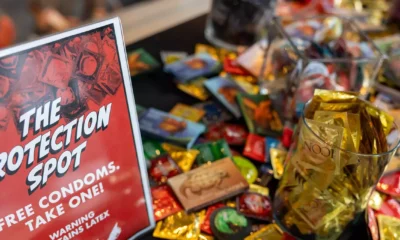2024 election
In Arizona, Young Generation Grapples with Uncertainty Over Abortion Access and Climate Action

Emilia Kim returned to Tucson this August with a renewed sense of purpose after studying abroad in China. At 17, Kim, now a senior at Basis Oro Valley High School, has re-evaluated her future aspirations, particularly regarding motherhood.
Her time abroad offered new insights, particularly as she witnessed stark differences in human rights and environmental regulations. These experiences led her to reflect deeply on the challenges faced by her mother as a single parent. They gave her fresh perspective on the critical issues in Arizona.
During her absence, Arizona grappled with significant debates over abortion access, experiences heightened by a record heat wave of 113 consecutive days over 100 degrees. Growing concerns over climate change exacerbated her anxiety about the prospect of motherhood. “The idea of being forced into it was overwhelming,” Kim stated, emphasizing the weight of contemporary issues on her generation’s psyche.
“I’ve always looked at my mom as both a role model and an inspiration,” Kim expressed in August. “However, I feel apprehensive about bringing a child into a world fraught with challenges that I am facing firsthand.” Her sentiments highlight a prevalent fear among many young people today about the feasibility of parenthood in a volatile environment.
Conversations around reproductive rights and climate change are converging, especially among Arizona’s youth. A survey by Arizona State University indicated that 72% of young voters prioritize reproductive rights, while 62% are equally concerned about climate issues. This intersection of concerns has motivated them to take action leading up to the upcoming election.
Kim, who serves as the statewide policy director for the Arizona Youth Climate Coalition, has been active in promoting local climate initiatives. Her organization contributed to Tucson’s first climate action plan, determined to combat the adverse effects of fossil fuel reliance. Yet, she feels the worsening climate crisis renders these efforts increasingly urgent.
This year marked a stark increase in heat-related fatalities in Arizona, revealing the dire need for immediate action. Over 600 deaths were recorded due to extreme heat—a 52% rise from the previous year. The mounting toll expresses a tangible sense of urgency and anxiety that young people experience as they witness worsening conditions.
The political landscape surrounding abortion has been tumultuous since the U.S. Supreme Court overturned Roe vs. Wade. Kim reacted strongly to Arizona’s restrictive abortion laws. “With the total ban, I realized I might have a child I cannot care for in a world I don’t support,” she lamented. Such upheaval breeds uncertainty for many young people navigating their futures.
Dr. DeShawn Taylor of the Desert Star Institute for Family Planning underscores the confusion arising from shifting abortion laws. Patients frequently arrive at her clinic misinformed about their rights, reflecting the complexities of Arizona’s legal landscape. “The web of restrictions creates misunderstanding,” Taylor noted, revealing the frustration both patients and providers face.
Since the controversial legal changes began, abortion access has fluctuated wildly, with laws shifting so frequently that even seasoned professionals struggle to keep up. The Arizona Supreme Court recently upheld a near-complete ban, only for it to be restrained by legal challenges and further legislative actions. Providers have found themselves navigating a convoluted system, while patients are left uncertain.
As the election approaches, the potential passing of a proposition to enshrine abortion rights into the state constitution could reshape the future landscape of reproductive health in Arizona. However, activists like Taylor stress that mere legal protections may not suffice in ensuring access, given the numerous existing restrictions.
Conversations about climate change also illustrate a necessary dialogue merging environmental and reproductive justice. Dr. Vivian Huang emphasizes that restrictive laws may deter new healthcare providers from operating in Arizona, further jeopardizing accessible care for vulnerable populations. With young individuals like Kim and Conley taking on advocacy roles, there’s a burgeoning demand for systemic change.
Conley, already involved with the Arizona Youth Climate Coalition, has hopes for intentional parenting amidst a climate crisis. “I will be voting in this election for a progressive future,” she affirmed. Her insight reflects a shared vision for the future, as young Arizonans align their advocacy for climate action with reproductive rights.
As the election draws near, Kim’s engagement highlights a larger sentiment among her peers. “These issues matter deeply to us,” she declared. Young Arizonans are stepping up to ensure their voices are heard, pushing for a future aligned with their values, even as they navigate a complex world. Their resolve embodies hope for transformative change on critical issues surrounding reproduction and climate.

















